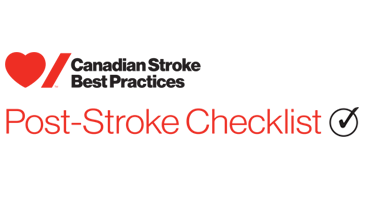- Definitions
- 1. Stroke Awareness, Recognition, and Response
- 2. Triage and Initial Diagnostic Evaluation of Transient Ischemic Attack and Non-Disabling Stroke
- 3. Emergency Medical Services Management of Acute Stroke Patients
- 4. Emergency Department Evaluation and Management of Patients with Acute Stroke and TIA
- 5. Acute Ischemic Stroke Treatment
- 6. Acute Antithrombotic Therapy
- 7. Early Management of Patients Considered for Hemicraniectomy
- 8. Acute Stroke Unit Care
- 9. Inpatient Prevention and Management of Complications following Stroke
- 10. Advanced Care Planning
- 11. Palliative and End of Life Care
Definitions
Advance Care Planning is a process of reflection and communication. It is a time for individuals to reflect on their values and wishes, and to communicate their preferences about future healthcare decisions if they were unable to speak for themselves. (Adapted from https://www.advancecareplanning.ca/)
Goals of Care are the clinical and personal goals for a patent’s episode of care that are determined through a shared decision-making process. They reflect a shared understanding between patients, family, caregivers, other support people and the clinical team. (Adapted from https://www.safetyandquality.gov.au/our-work/comprehensive-care/essential-elements-comprehensive-care/essential-element-2-identifying-goals-care)
Recommendations and/or Clinical Considerations
Advance Care Planning
- Persons with stroke, as well as their families and informal caregivers, should be approached by the interdisciplinary stroke team to participate in advance care planning (ACP) [Strong recommendation; Low quality of evidence].
- Respectful advance care planning should be integrated as part of a comprehensive care plan, taking into consideration values and preferences with information regarding the patient’s illness, understanding, prognosis, medically appropriate treatments and future medical care. [Strong recommendation; Low quality of evidence].
- Advance care planning may include identifying a substitute decision-maker (proxy, agent, or power of attorney), and discussing the patient’s personal values and preferences to be applied in future if the need arises to make healthcare decisions or provide consent on behalf of the patient [Strong recommendation; Moderate quality of evidence].
- Advance care planning discussions should be documented and reassessed regularly with the active care team and substitute decision-maker, especially when there is a change in the patient’s health status [Strong recommendation; Low quality of evidence].
Section 10 Clinical Considerations
- The interdisciplinary stroke care team should have the appropriate communication skills and knowledge to respectfully address the physical, spiritual, cultural, psychological, ethical, and social needs of the person with stroke and their family and informal caregivers.
- Ensure advance care planning discussions are individualized and culturally sensitive.
- Processes should be established to support, patients, family and healthcare staff who are experiencing conflicts over advanced care decisions being made by the patient or substitute decision maker. Referrals can be made to social work, palliative care, spiritual care, and ethics.
Advance care planning is a process through which a patient, in consultation with healthcare providers and family members, states their preferences about future healthcare decisions if the patient become incapable of participating in decision-making regarding their healthcare needs. Elements to consider in ACP include the patients’ prognosis, treatment options, goals of care, and the identification and documentation of end-of-life wishes. Advance care planning is an important educational aspect of any patient encounter when a serious or chronic condition is involved and where the risk of a recurrent event is higher, such as with stroke.
People with lived experience stressed the importance of advance care planning among family members and loved ones and discussed how the concept may not be well-known. They talked about the difficulty that family members may experience when making healthcare decisions for someone else, especially if those discussions did not take place when the person was competent and able to participate. People with lived experienced explained that although these types of conversations may be new or challenging, they ultimately allow the person to have some control and allow their voice to be heard. These conversations can also support family members when they are faced with stressful decisions about the person’s health. People with lived experience also emphasized the importance of having advance care planning conversations throughout their lives, and to be aware that one conversation may not be enough as people’s wants and wishes can change over time.
People with lived experience expressed that normalizing the process of developing an advance care plan would be helpful, and they see this lack as a gap. They also discussed the value of having a resource to guide these discussions, especially for those who haven’t considered advance care planning previously.
To ensure people experiencing a stroke receive timely stroke assessments, interventions and management, interdisciplinary teams need to have the infrastructure and resources required. These may include the following components established at a systems level.
- Protocols for advance care planning to elicit patient and family goals for care preferences and ensuring these are documented and communicated to decision-makers and healthcare team members.
- Information on advance care planning and links to local stroke support organizations and their services for staff to share with patients and families.
- Communication and skills training for physicians, nurses, and allied health professionals that addresses supporting patients and their families through advance care planning and dealing with potential conflicts over a patient’s wishes and decisions.
System Indicators:
In development.
Process indicators:
- Proportion of patients with stroke who have been approached to participate in advance care planning and/or who have a documented conversation with a healthcare provider.
- Proportion of patients with stroke who identify a substitute decision-maker.
- Proportion of patients with stroke who complete a personal or advance care plan and have it documented on their chart.
Patient-oriented outcome and experience indicators:
- Proportion of patients with stroke with advance care plans whose actual care was consistent with the care defined in their plan.
Measurement Notes
- Documentation for the advance care plan measures may appear in consult notes, nursing notes, social work notes, or physician notes.
- A copy of the advance care plan should ideally be included in the patient’s chart.
- Data quality may be an issue with some of these performance measures. Improved documentation should be promoted among healthcare professionals.
- Patient and family experience surveys should be used to monitor care quality which includes end-of life experiences.
Resources and tools listed below that are external to Heart & Stroke and the Canadian Stroke Best Practice Recommendations may be useful resources for stroke care. However, their inclusion is not an actual or implied endorsement by the Canadian Stroke Best Practices writing group. The reader is encouraged to review these resources and tools critically and implement them into practice at their discretion.
Healthcare Provider Information
- Advance Care Planning in Canada
- Canadian Virtual Hospice: My Grief Learning Modules
- Canadian Virtual Hospice: The Learning Hub
- Canadian Hospice Palliative Care Association Resource
- Canadian Virtual Hospice: Decisions
- The Ontario Acute Stroke Best Practice Coordinators and the Ontario Regional Education Group in collaboration with Heart & Stroke: Key Changes to the 2022 Acute Stroke Management Canadian Stroke Best Practice Recommendations
Information for people with lived experience of stroke, including family, friends and caregivers
- Heart & Stroke: Your Stroke Journey
- Heart & Stroke: Post-Stroke Checklist
- Heart & Stroke: Acute Stroke Management Infographic
- Canadian Virtual Hospice: My Grief Learning Modules
- Canadian Virtual Hospice: The Learning Hub
- Advance Care Planning in Canada
- Canadian Hospice Palliative Care Association Resource
- Canadian Virtual Hospice: Decisions
Evidence Table and Reference List
Sex and Gender Considerations Reference List
Elements to consider in advance care planning (ACP) include the patients’ prognosis, treatment options, goals of care, and the identification and documentation of end-of-life wishes. In a recent survey, Johnson et al. (2019) surveyed 219 patients attending an outpatient stroke clinic a median of 5 months following a stroke. Patients completed the Planning After Stroke Survival survey, designed to explore the prevalence, experiences, and influencing factors around goals-of-care and ACP conversations. Seventy-three percent of patients reported having previously discussed ACP with a physician, while 58% were interested in having additional ACP conversations with their stroke doctor. Green et al. (2014) used participant observation and semi-structured interviews to gather information from 14 patients recruited from an acute stroke unit, 2 rehabilitation units, and 4 healthcare professionals, that was related to the communication processes regrading advance care planning (ACP). Four key themes emerged related to why participants engaged or did not engage in the ACP process: 1) lack of perceived urgency by participants, many of whom felt the physician and/or family members would make decisions in accordance with their wishes; 2) a lack of initiation by healthcare professionals to discuss issues around ACP; 3) healthcare professionals being hesitant about initiating discussions related to ACP, and uncertain as to the best timing for such discussions. There was also a lack of awareness on the part of healthcare professionals as to what ACP is, or thinking it was outside their scope of practice. Finally, 4) confusing ACP with advance directives, designation of care, and living wills.
Although no stroke-specific studies have been published that examine the effectiveness of ACP, several exist that include patients with mixed diagnoses. Results from a small number of studies suggest that interventions aimed at increasing ACP have been successful in significantly increasing the likelihood that end-of-life wishes are known and respected. In a study of 309 patients admitted to internal medicine, cardiology, or respiratory medicine, Detering et al. (2010) randomized patients to receive usual care or formal advance care planning from a trained facilitator. The intervention was based on the Respecting Patient Choices model, which involves reflection on goals, values, and beliefs; documentation of future healthcare wishes; and appointment of a surrogate decision-maker. Of those who died, end-of life wishes were significantly more likely to be known and respected for participants in the intervention group compared with those in the control group (86% vs. 30%, p<0.01). Following the death of a loved one, family members of those in the intervention group reported significantly less anxiety and depression and more satisfaction with the quality of their relative’s death, compared to control group family members. Kirchhoff et al. (2012) randomized 313 patients with congestive heart failure or end-stage renal disease who were expected to experience serious complication or death within 2 years, as well as their surrogate decision-makers, to receive a patient-centred advance care planning intervention or usual care. The intervention was composed of a 60- to 90-minute interview with a trained facilitator to discuss disease-specific end-of-life care issues and options and documentation of treatment preferences. There were 110 patients who died within the study period, of which 26% required a surrogate decision-maker at the end-of-life. Only 1 patient in the intervention group and 3 in the control group received end-of-life care that was contrary to their wishes for reasons other than medical futility. With respect to resuscitation preferences, non-significantly fewer patients in the intervention group received care that was contrary to their wishes (1/62 vs. 6/48).
Sex and Gender Considerations
An online opinion survey of 1,523 randomly selected Canadians in the general population, sponsored by Canadian Researchers at the End-of-Life Network (CARENET), examined knowledge and attitudes towards ACP (Teixeira et al. 2015). Six sociodemographic and economic variables examined, of which sex was one. Models were developed to explore independent predictors of several outcomes including: 1) has heard of ACP, 2) discussed ACP with family/friends, 3) discussed ACP with healthcare provider, 4) has a written ACP plan, 5) has a designated decision maker and 6) an aggregate ACP outcome. While recognition of the term ACP was generally low, there were some significant sex differences in responses based on statistical models. Women were 58% more likely to discuss ACP with their friends. In the aggregate model of ACP knowledge, female sex was also a significant predictor. Other independent predictors were older age and higher income.





